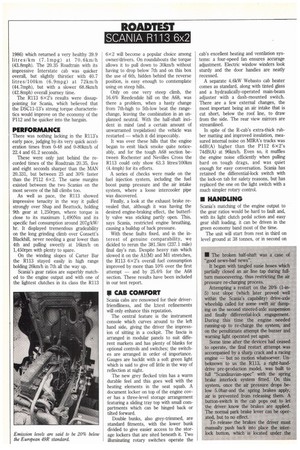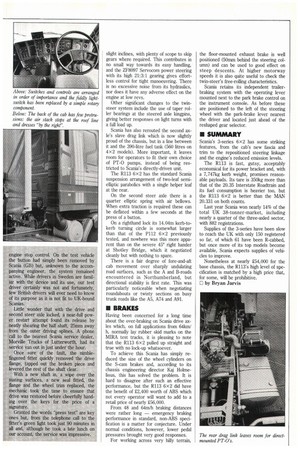• The broken half-shaft was a case of "good news-bad news".
Page 60

Page 61

If you've noticed an error in this article please click here to report it so we can fix it.
It began with tangled suzie hoses which partially closed an air line tap during fullturn manoeuvering, thus restricting the air pressure re-charging process.
Attempting a restart on the 20% (1-in5) test slope (which later proved well within the Scania's capability) drive-axle wheelslip called for some swift air dumping on the second steered-axle suspension and finally differential-lock engagement. During this time the engine needed running-up to re-charge the system, and on the penultimate attempt the buzzer and warning light operated yet again.
Some time after the devices had ceased to operate, the final restart attempt was accompanied by a sharp crack and a racing engine — but no motion whatsoever. Unbeknown to us the R113, a right-handdrive pre-production model, was built to full "Scandinavian-spec" with the spring brake interlock system fitted. On this system, once the air pressure drops below 5.0bar-and the spring brakes apply, air is prevented from releasing them. A button-switch in the cab pops out to let the driver know the brakes are applied. The normal park brake lever can be operated, but to no effect.
To release the brakes the driver must manually push back into place the interlock button, which is located under the engine stop control. On the test vehicle the button had simply been removed by Scania (GB) but, unknown to the accompanying engineer, the system remained active. While drivers in Sweden are familiar with the device and its use, our test driver certainly was not and fortunately, few British drivers will ever need to know of its purpose as it is not fit to UK-bound Scanias.
Little wonder that with the drive and second steer axle locked, a near-full power restart attempt found its release by neatly shearing the half shaft, 25mm away from the outer driving splines. A phone call to the nearest Scania service dealer, Morville Trucks of Lutterworth, had its service van out in just under the hour.
Once sure of the fault, the nimblefingered fitter quickly removed the drive flange, tapped out the broken piece and levered the rest of the shaft clear.
With a new shaft in, a wipe over the mating surfaces, a new seal fitted, the flange and the wheel trim replaced, the mechanic took the time to ensure that drive was restored before cheerfully handing over the keys for the price of a signature.
Granted the words "press test" are key ones but, from the telephone call to the fitter's green light took just 90 minutes in all and, although he took a late lunch on our account, the service was impressive.
























































































































































